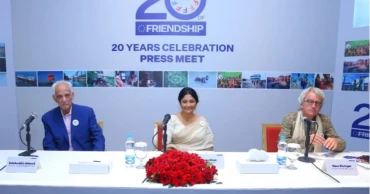NGO
873 killed during Anti-Discrimination Movement, 21,000 injured: Health Adviser
Health Adviser Nurjahan Begum on Sunday highlighted the toll of the anti-discrimination movement, revealing that 873 individuals lost their lives, and over 21,000 were injured. Speaking at a meeting titled Involvement of NGOs in Health Services organized by the NGO Affairs Bureau, Noorjahan urged collective efforts to rehabilitate the injured and support those left disabled or jobless.
She called on NGOs to identify individuals who have been overlooked in receiving medical care or have lost their livelihoods due to injuries, such as rickshaw pullers who can no longer work. “Of the 21,000 injured, 400 have lost their eyesight. What future awaits them? These individuals are our own people. We must stand by them during their mental and emotional trauma,” she said.
The Health Adviser emphasized the shared responsibility of government and NGOs to integrate the injured into education and the workforce. “Seventy percent of those injured are common citizens, including rickshaw and van pullers, while the rest are students,” she added.
Health Adviser calls for better utilization of medical training and return of doctors from abroad
She also expressed concerns about maternal and child mortality, child marriage, and school dropouts, calling for enhanced collaboration between the government and NGOs to tackle these issues. On the dengue outbreak, she stated, “Deaths from dengue are avoidable if we raise public awareness. Everyone must act responsibly by preventing littering, clearing stagnant water, and staying vigilant.”
Nurjahan Begum further noted corruption and mismanagement in the health sector but expressed hope for improvement through mutual cooperation. “The government alone cannot resolve these issues overnight, but with shared efforts, we can pave the way for progress,” she said.
The discussion, chaired by Acting Director General of the NGO Affairs Bureau Md. Anwar Hossain, was attended by special guests Saifullah Panna, Secretary at the Chief Adviser’s Office, and Md. Saidur Rahman, Secretary of the Health Services Division, along with representatives from local and international NGOs working in healthcare.
1 year ago
Role of NGOs upheld in implementing National Youth Policy-2017
A discussion meeting on the role of NGOs in the implementation of the National Youth Policy-2017 was held in Dhaka.
Rupantor, a non government organization, organized the discussion programme at the NGO Affairs Bureau Hall Room in the city's Agargaon area.
Director General of NGO Affairs Bureau Sheikh Md Moniruzzaman who was present as the chief guest at the exchange meeting, said that the main source of youth empowerment is to be aware of one's rights, responsibilities and duties, as well as to increase the participation of youth in the main development stream through youth empowerment, participation and youth inclusion.
CPD ED outlines challenges facing the economy at BIPSS policy circle
General secretary of Jatiya Press Club and editor of Bhorer Kagoj Shyamal Dutta who was present as special guest at the meeting, said that the youth should be involved while making new activities in youth policy and textbooks, by which their interest in learning will develop.
He also said that the youth, especially the marginalized youth, are far behind in terms of employment. The youth should create a medium to connect with the tradition and culture of Bangladesh.
Additional Secretary of the Ministry of Hill Chittagong Pradeep Kumar Mohottam as special guest said that the youth should be encouraged to be more involved in social work.
Biman Dreamliner returns to Dhaka due to cockpit windshield crack
Director of Youth Development Department Priyosindhu Talukder said that if ICT, Ministry of Culture and Youth Development Department work together, opportunities will be created in the field of youth employment so that the youth will be empowered.
He also said that the implementation of the rights of the youth will be easier only by developing inter-relationships with the youth forums at the national and local levels.
Director of NGO Affairs Bureau Tapan Kumar Biswas said that if Bangabandhu's Sonar Bangla is to be built, the youth must come forward.
Head of Cooperation of the embassy of Switzerland Corinne Henchoz Pignani was present as the guest of honor at the programme. She said the main plan of the Bangladesh government is that no one will be left behind. With that objective, the youth of any religion, caste and community can participate in this project to implement the trust project. Besides, Aastha scheme will help in making a youth a responsible citizen.
Gas supply to improve in Dhaka, adjacent areas in a day or two : Nasrul
Executive Director of Rupantor Rafiqul Islam Khokon gave a welcome speech at the exchange meeting. The discussion meeting was moderated by Wazed Feroze, Executive Director of DemocracyWatch and Swapan Pal, Executive Director of Sabalamby Unnayan Samity (SUS) Swapan Kumar Guha, Executive Director of Transformation gave vote of thanks.
Among others in attendance were Sabina Yasmin Lubna, Program Manager of the Embassy of Switzerland, youth representatives from various regions of Bangladesh, representatives of civil society, government officials and officials of Astha Alliance.
With financial support from Switzerland, Rupantor, DemocracyWatch, Sabalamby Unnayan Samity, ASHIKA, Trinamool Unnyan Sangstha, GRAUS are implementing ASTHA projects in 147 upazilas in 18 districts of seven divisions of Bangladesh.
2 years ago
Zonta Clubs of Bangladesh commemorate UN day
The Zonta Clubs of Bangladesh held a special event to celebrate United Nations Day at the Baridhara Diplomatic Club on Friday.
The event honored the United Nations' work and Zonta International's collaboration as the largest non-governmental organization (NGO) supporter of UN Women programs.
E-cigarettes and vaping should be banned: Speakers
Berhanu Assefa Tegegene, Manager of UNOPS Bangladesh, attended the event as special guest.
The celebration highlighted Zonta's commitment to climate change mitigation and gender equality.
Berhanu Assefa Tegegene, Manager of United Nations Office for Project Services (UNOPS) Bangladesh, pointed out that women comprise nearly 40% of the agricultural workforce in developing nations.
10 Bangladeshis trafficked to India return home via Tamabil
“Climate change, however, disproportionately affects the agriculture and food sectors, adversely impacting approximately 43% of women. Despite this alarming reality, only 20% of women participate in forums and activities addressing climate change, even though they constitute 80% of those affected,” he said.
Dr. Zareen Delawer Hussain, Vice Area Director of Zonta’s Area 2, District 25, reiterated the urgent need to address climate change and gender equality.
Man, grandson found dead in Laxmipur septic tank
“We will work on climate change and gender equality. This is a serious issue that needs to be focused now,” she said.
2 years ago
UNHCR, NGOs seek stronger partnerships for lasting solutions for forcibly displaced, stateless in Asia Pacific
UNHCR, the UN Refugee Agency, together with non-governmental organizations (NGOs) and civil society actors in the Asia and the Pacific region, on Friday recommitted to enhanced collaboration to work towards sustainable solutions for the forcibly displaced and stateless.
In collaboration with the Asia Pacific Refugee Rights Network (APRRN), International Council of Voluntary Agencies (ICVA) and the Asia Pacific Network of Refugees (APNOR), UNHCR’s Regional NGO Consultations for 2023 were held in Bangkok, Thailand on 14 and 15 September.
The in-person and virtual event brought together over 180 participants, representing 161 organizations from 19 countries in the Asia and the Pacific to discuss topics around the central theme of “Promoting Inclusion for Sustainable Solutions.”
2 Rohingyas shot dead during gunfight at Ukhiya camp
Currently, there are over 7 million refugees or asylum-seekers and 5 million conflict-affected internally displaced people (IDPs) in the region, as recorded at the end of 2022.
Most of those displaced live in increasingly protracted situations in countries where they have found refuge.
“Inclusion is a complex subject, often misinterpreted, but when dissected covers many of the key issues we collectively work on to find local solutions for refugees: education, livelihoods, skills and healthcare,” said Indrika Ratwatte, UNHCR Director for Asia and the Pacific.
The consultations provided an opportunity for humanitarian partners in Asia and the Pacific to discuss best practices and approaches on how including displaced populations and stateless people in all aspects of life contributes to resilience and long-lasting solutions for the benefit of the whole society.
UK to push for long-term solution to Rohingya crisis
“Meaningful inclusion requires a shift in thinking that those forcibly displaced are not beneficiaries of support but are assets. They make important contributions to the communities that they are a part of and by extension require supportive policies and protections to really enable their inclusion,” said Keya Saha Chaudhury, ICVA Regional Representative for Asia and the Pacific.
Among the specific topics discussed were how UNHCR, NGOs, and community-based organizations can cooperate with and support member States to promote inclusion in national systems.
“Empowering refugee-led organizations is essential. These organizations possess an intimate understanding of the communities they represent and can serve as valuable intermediaries, bridging communication gaps, and facilitating community-driven solutions. Secondly, promoting gender balance is imperative. Member states should actively work to ensure equitable representation of women in decision-making processes at all levels, both within refugee communities and in engagements with government bodies,” said Najeeba Wazefadost, APNOR Executive Director.
UN Assistant Secretary-General Kanni Wignaraja visits Ukhia Rohingya camp
Throughout the Consultations, participants also acknowledged the important role that refugee-led organizations and civil society play in the refugee response; how to further encourage countries in the region to engage in resettlement and complementary pathways; social-economic inclusion as well as the need for predictable and equitable responsibility-sharing.
“We need to think of innovative ways to incorporate the skills that refugees bring to the host communities. We need to ensure that refugees have a platform to utilize those skills and be able to contribute to society so that they can go from vulnerable groups to capable communities,” said Hafsar Tameesuddin, APRRN Co-Secretary General of Asia Pacific Refugee Rights Network.
Recommendations from the discussions will be presented at UNHCR Executive Committee in October 2023 and inform and support the global NGO consultations in Geneva in June 2024.
The first UNHCR-NGO Regional Consultations were held in July 2021, and focused on the social-economic inclusion of refugees in the context of Covid-19.
2 years ago
Friendship celebrates 20 years of transforming lives in remote, unaddressed communities
Friendship, an NGO working as a social purpose organisation, observed its 20 anniversary in the country with the commitment to continue its endeavour to promote the development of the remote and unaddressed communities at the forefront of the climate crisis.
On the occasion, addressing a press conference at the Intercontinental Hotel in the city on Friday Friendship founder Runa Khan said that in times of global crisis, Friendship’s mission and values are as relevant and important as ever.
“Today I believe, because of its impact, this work has to be scaled up and replicated with quality and dependability,” she added.
She mentioned that an unprecedented climate disaster and a global cost-of-living crisis push millions into poverty all over the world.
Friendship began its journey with an innovation: a floating hospital in the shifting river islands (chars) of the Brahmaputra/Jamuna River, where conventional healthcare systems were impossible to operate.
Due to the temporal nature of the landscape, Friendship was forced to innovate from the outset.
Friendship started in 2002 guided by its vision of a world where people—especially the hard-to-reach and unaddressed—have equal opportunities to live with dignity and hope.
Runa Khan said the Friendship’s work has been driven by an uncompromising commitment to its code of ethics and core values of integrity, dignity, justice, quality and hope.
Following the press conference, Friendship’s Char Theatre performed an adaptation from its repertoire of plays that address social issues like child marriage, dowry and basic rights in char communities.
Along with these events, an exhibition was organised at the same venue, displaying the preservation of the wooden boats of Bengal, handcrafted slow fashion products produced by char women, dignity inspired artwork by Friendship schoolchildren and the award-winning buildings designed by architect Kashef Mahbub Chowdhury.
Marc Elvinger, Co-Chair of Friendship International, Salahuddin Ahmed, chair of the board of directors of Friendship Bangladesh, Friendship national and international chairs, board members and other senior members of the organisation attended the events.
3 years ago
CSOs, NGOs for transparency, accountability in Sylhet flood assistance
The civil society organisations (CSOs) and NGOs have called for ensuring transparency and accountability in the delivery of humanitarian assistance for Sylhet flood survivors.
They also demanded the transfer of operational leadership to local NGOs, adding that the role of the UN agencies and INGOs will have to be limited to monitoring and technical assistance.
The CSO leaders were speaking at an online press conference Saturday organised by the Sylhet chapter of the Bangladesh NGO-CSO Coordination Process (BDCSO Process).
Rezaul Karim Chowdhury, executive director at COAST Foundation, said there should be a transparent and competitive policy for the UN Central Emergency Response Fund (CERF) fund disbursement. "This time the size of the fund is $5 million as announced by the UN emergency relief coordinator."
"The fund should not only be earmarked for the UN agencies, Red Cross and large national NGOs. There is little disclosure of the INGO funding although the UN already raised $2.5 million," he added.
Rezaul said: "There should be a policy for building sustainable and accountable local civil society in Sylhet. Funds should be disbursed through open, competitive and transparent practices."
Nayeem Gowhar Warha, secretary of the Disaster Forum, urged the government to depute a senior official as a relief commissioner in Sylhet and Sunamganj for relief coordination.
Read: BDCSO Process to hold virtual annual conference from Oct 6-8
AKM Jashim Uddin, director of the Association of Development Agencies in Bangladesh (ADAB), said given the Grand Bargain commitment, the UN and INGOs should consider allocating at least 25 percent of the funds for the local NGOs.
Tofazzel Hossain, chairman of BDCSO process in Sylhet, Babul Akhter, coordinator of ADAB Sylhet, Badrul Islam, executive director of Jaintia Shinnomul Songstha (JASHIS), Badrul Akter, secretary of ADAB in Sylhet, Sazzadur Rahman, executive director of Poddha Sylhet, and Jobair Hossain, executive director of Shatadol Sylhet, also spoke.
3 years ago
St Gregory's North America alumni sets up not-for-profit organisation
Alumni of St Gregory's High School in North America have organised themselves into a not-for-profit organisation, Gregorians of North America (GNA).
GNA was incorporated as a not-for-profit organisation in January of 2022. Through the organisation, the alumni want to give back to the school and Bangladesh.
Dr Faisal M Rahman, founding chairman of GNA, describes the three core missions of the organisation as creating a database of alumni so that they can assist each other, using their collective resources to help their school and support the development of Bangladesh.
Towards that end and to commemorate the 140th anniversary of the prestigious educational institution, the first annual meeting of GNA will take place in Washington DC on July 30.
About 300 people, including 200 alumni, from seven decades, are expected to attend the day-long programme.
The event will include an interactive session with teachers and students in Dhaka and conference attendees, many of whom are working for major organisations – including the US government, multinational companies such as Google and Amazon and world-class universities such as Harvard and Johns Hopkins.
Spearheaded by the former vice-chancellor of Brac University Dr Syed Saad Andaleeb, the GNA alumni group has organised themselves into task forces to help St Gregory's educational programmes, facilities, teachers and students as well as develop broader implementable initiatives for the ongoing development of Bangladesh, said a media statement Sunday.
Read: School Handball: St. Gregory outplay Dhanmondi Tutorials by 31-1 goals
Wahid Shams, the founding secretary of GNA, said: "This is a nostalgic, yet profoundly inimitable opportunity for risk-free networking with a highly-accomplished group of Gregorian brothers in North America who are poised to give back to their roots."
With the theme "giving back," alumni speakers such as Dr Ajmal Sobhan, a renowned general surgeon in the US, will be featured in the programme.
Sobhan of the 1964 batch has worked extensively around the world for the poor and underprivileged.
In Bangladesh, he is running a drug rehabilitation centre in Manikganj, which was founded by Brother Rev Ronald Drahozel for the destitute.
As part of the first meeting, a special souvenir magazine is being published by Toitomboor Prokason with contributions from alumni such as Professor Emeritus Dr Serajul Islam Chowdhury, Iqbal Bahar Chowdhury, Ambassador and Foreign Secretary Hemayet Uddin, Ambassador Ziauddin Ahmed, cricketer Yousuf Rahman Babu, and Daily Star Editor Mahfuz Anam.
The magazine is edited by Professor Dr Shawkat Hussain of Dhaka University with the assistance of an editorial board.
Founded 140 years by the Catholic Order of Holy Cross, St Gregory's counts among its alumni the first prime minister of Bangladesh Tajuddin Ahmed, author of Bangladesh's first constitution Dr Kamal Hossain, the first attorney general of Bangladesh Faqueer Shahabuddin, former president Dr Badruddoza Choudhury, former prime minister and vice-president Barrister Moudud Ahmed, Nobel Laureate in Economist Dr Amartya Sen, National Professor Dr Jamilur Reza Chowdhury, economist and public policy analyst Dr Debapriya Bhattacharya, Lieutenant General Khwaja Wasi Uddin, the first US Ambassador of South Asian descent Ambassador Osman Siddique, folk singer Mustafa Zaman Abbasi, and comedian Bhanu Bandopadhyay.
Every cabinet of Bangladesh since its liberation has had at least one alumnus from St Gregory's, including the current Industries Minister Nurul Majid Mahmud Humayun.
3 years ago
BRAC at 50 : What about the next 10?
Fifty years at the top is an achievement for any organization and BRAC has done that. Abed bhai came from a history that suited the first fifty years. But that history is rapidly ending and the challenge for the current BRAC leadership is to do a new “Abed”. As it celebrates the past, the future kicks at the door. The old BRAC is over with its “noblesse oblige” values to do good for others less advantageous.
In the post 1971 turmoil and turnover, NGOs were the last resort of the well-meaning and dependent middle class who got left out in the post-Independence class-power distribution. But NGOs are coming to an end. If BRAC is to survive, it needs to look at a future without borrowed wisdom from the West and explore and use the lesson from why despite so much denial, the rural poor have done so well.
Also read: UNDP to work with BRAC for accelerating pace of poverty reduction
Intermediaries in decline
BRAC is like all development organizations - an intermediary outfit. It carried resources of the better off world, mostly external to the rural poverty zones. It sustained the poor and as food related distress declined, graduation from ultra-poverty increased and general health and social conditions got better overall. But they were old battles and the BRAC after 50 faces a world in which people on their own tackled Covid even as the West predicted disaster while withholding vaccines for the rest of the world.
The “rights-based” idea spaces dominated by the NGO is largely replaced by the economic , more natural than elite constructed. Increasing strength of the BRAC client population means old services are not as required as before.
Micro-credit as an internal co-funder of its operations, is very important but the donor world is battered beyond belief. In the last 2 years, our most shocking discussion was with a donor who said, “GOB doesn’t listen to us anymore as it has so much more money.” The mental shift has to be from “Bangladesh as poor” to “Bangladesh as potentially well off” . It’s the Liberal-Left that stigmatizes wealth making, those who are not in poverty themselves. This colonial hangover must go and as China has shown wealth making of the majority is a social change tool.
Also read: BRAC continues emergency services for Rohingyas, locals amid Covid-19 pandemic: BRAC Global ED
Into the future with dirty hands and all
BRAC didn’t want to enter the migration sector as a player because Abed bhai didn’t want people crowding the office and parades of unhappy clients. He didn’t then but when he did try it didn’t work. That was a lost opportunity in 2005. It’s the migration money that has become the most powerful agents of change in the rural areas. Rural intermediation has also grown but it is located in economics and exclusive to them as experiences of the Ultra-poverty alleviation shows.
Banking is weak because most loans go through connections in the formal sector. He thought that Bkash would make banking easier and it has. The rise of digital money also shows that. Clearly, he was thinking on the edge of the last historical phase but the focus on economics was imagined as support of the poor and micro entrepreneurs. That has changed as SME enterprise and rural bonds and savings markets are bigger than ever. Agriculture and Aarong are small time sectors. Its economic enhancement projects need to go to scale. BRAC needs to reimagine the future as Abed bhai did 50 years back.
Increasingly, the people show they are able to organize their life better than the GOB does and as donors prescribe. Hanging on to SDGs should not be BRAC’s priority but high intensity economic expansion of people should be. A much strengthened rural population doesn't need NGOs as much as they did till the 2000s. BRAC needs to get a makeover.
Hopefully, it's goodbye to the old BRAC and welcome to the new BRAC. Congrats.
3 years ago
Woman held in Ctg for duping poor people
Police have arrested a 33-year-old woman in Chattogram for allegedly duping poor people on the pretext of providing loans.
The arrestee has been identified as Jannatun Naima.
On Monday evening, the victims, mostly low-income earners and beggars, gheraoed Naima’s office in the Hamzarbagh area and demanded that she returned their money.
Cops were soon alerted and a team from the Panchlaish police station rushed to her rescue, only to place her under arrest subsequently.
Also read: Two arrested for IGP's signature fraud
According to police, Jannatun runs an NGO -- ‘Save As Your Earn’ -- but she has not taken the mandatory licence from the government.
Officer-in-charge of Panchlaish police station Zahidul Kabir said, "Naima who started the NGO last year took money from domestic helps and other economically poor people in the name of arranging a loan of Tk 4,000 each from the Ministry of Disaster Management and Relief."
"The NGO collected Tk 200 each from around 14,000 low-income earners over the past two years," he added.
Also read: Man gets one year in jail over fraud in Ektee Bari Ektee Khamar project
To gain people’s trust, the accused showed them a draft of the loan documents, forging the signature of a deputy secretary of the department of Disaster Management, the OC said.
Whenever people would enquire about the loans, she would tell them that they will get a phone call directly from the ministry, said OC Zahidul.
4 years ago
NGOs urged to design plan of action taking Covid-19 into consideration
Speakers at a programme called upon partner NGOs of BRAC to chalk out a plan of action for achieving the Sustainable Development Goals (SDGs) and improving the condition of disadvantaged people taking the Covid-19 situation into consideration.
They made the call while addressing a partner orientation workshop held virtually on Monday.
Also read:Webinar emphasises effective govt-NGO collaboration
BRAC organized the event to increase the capacities of its partner NGOs as well as highlight the future plan of action and recommendation.
Hasina Akhter Huq, Area Director of Humanitarian Crisis Management Programme (HCMP) of BRAC; Mohammad Ziauddin, head of admin, logistics and procurement of HCMP and others spoke at the event.
Md. Abdul Matin Shardar, head of Host Community Programme of HCMP, moderated the function.
Hasina Akhter Huq, in her address, said that their future plan of action should be designed giving priority to the issue of achieving the SDGs and improvement of conditions for disadvantaged people.
"Besides, we have to give importance to real and welfare-oriented activities so that the local community can judge those activities as their own. It will bring more dynamism to the activities in the future," she observed.
Also read:BRAC to increase capacities of partner NGOs
Over 50 representatives from six partner NGOs of BRAC attended the event.
The six NGOs are: Society for Health Extension and Development(SHED), Programme for Helpless and Lagged Societies (PHALS), Alliance for Cooperation Aids Bangladesh (AKLAB), Jago Nari Unnayan Sangstha (JNUS), NONGOR and Help-Cox’s Bazar.
The speakers stressed on carrying out advocacy activities and other campaigns through online platforms due to the prevailing Covid-19 situation.
Other issues such as maintaining the safeguarding matter for protection of employees, maintaining Donor and BRAC values, and more transparency and accountability regarding the implementation of projects came up for elaborate discussion at the event.
4 years ago







.jpg)







